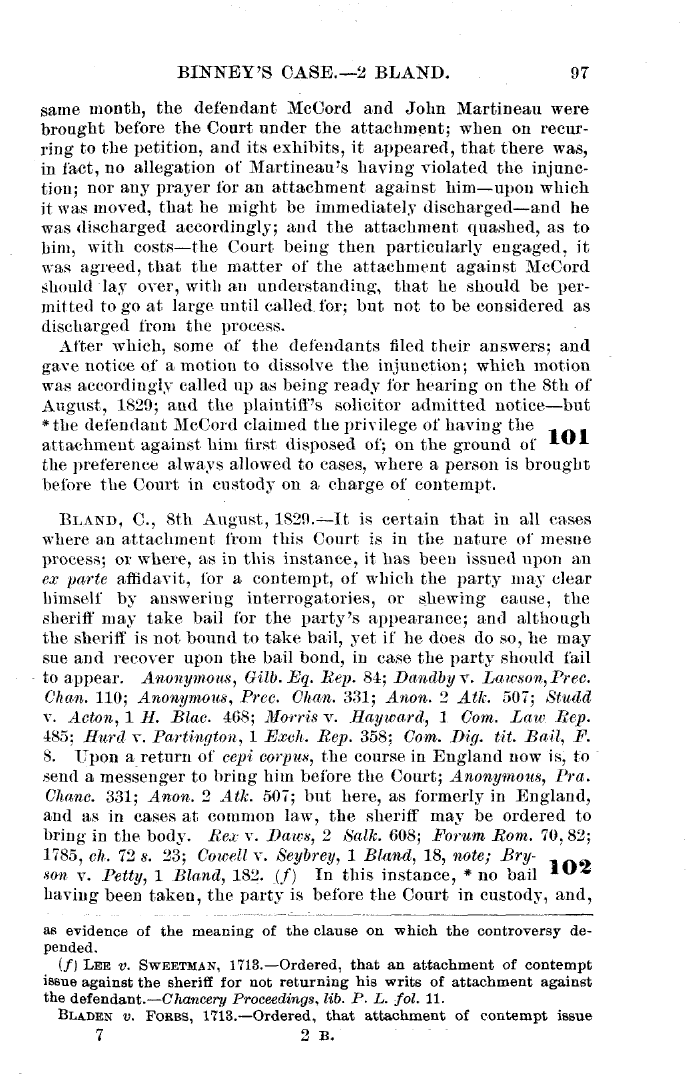|
BINNEY'S CASE- 2 BLAND. 97
same month, the defendant McCord and John Martineau were
brought before the Court under the attachment; when on recur-
ring to the petition, and its exhibits, it appeared, that there was,
in fact, no allegation of -Martineau's having violated the injunc-
tion; nor any prayer for an attachment against him-upon which
it was moved, that he might be immediately discharged-and he
was discharged accordingly-; and the attachment quashed, as to
him, with costs-the Court being then particularly engaged, it
Nvas agreed, that the matter of the attachment against McCord
should -la;i over, with an understanding, that he should be per-
mitted to go at large. until called. for; but not to be considered as
discharged from the process.
After which, some o.f the defendants filed their answers; and
gave notice of a motion to dissolve the injunction; which motion
was accordingly called up as being ready for hearing on the 8th of
August, 182'9; and the plaintiff's solicitor admitted notice-but
*the defendant McCord claimed the privilege of having the
attachineut against: him first disposed of; on the ground of 1
the preference always allowed to cases, where a person is brought
before the Court in custody on a charge, of contempt.
BLAND, C., Sth August, 1829.=It is certain that in all cases
where an attachment from this Court is in the nature of mesne
process; or where, as in this instance, it has been issued upon an
ex parte affidavit, for a contempt, of which the party may clear
himself by answering interrogatories, or shewing cause, the
sheriff mad- take bail for the party's appearance; and although
the sheriff' is not bound to take bail, yet if lie does do so, he may
sue and recover upon the bail bond, in case the parts- should fail
to appear. Anonymous, Gilb.1)q. Rep. 84; Dandby v. Lawson, Prec.
Chan. 110; Anonymous, Prec. Chan. 331; Anon. 2 Atlc. 507; Studd
v. Acton, I H. Blac. 468; Morris v. Rayward, I Com. Law Rep.
185; Hurd, v . Parthkgton, I Exch. Rep. 368; Com. Dig. tit. Bail, F.
8. ZTpon a return of cepi corpus, the course in England now is, to
send a messenger to bring him before the Court; Anonymous, [Ira.
Chant. 331; Anon. 2 Atk. 507; but here, as formerly in England,
and as in cases at common law, the sheriff may be ordered to
bring in the body. Rex v. Daws, 2 Salk. 608; Forum Rom. 70, 8:;;
1785, ch.. 72 s. 23; Cowell v. Seybrey, 1 Bland, 18, note; Bry-
so-n. v. Petty, 1 Bland, 182. -(f) In this instance, * no bail 1
having been taken, the party- is before the Court in custody, and,
as evidence of the meaning of the clause on which the controversy de-
pended.
(f) LEE v. SWEETMAN, 1713.-Ordered, that an attachment of contempt
issue against the sheriff for not returning his writs of attachment against
the defendant.-Chancery Proceedings, lib. P. L. fol. 11.
BLADEN v. Fortes, 1713.-Ordered, that attachment of contempt issue
7 2 B.
|

